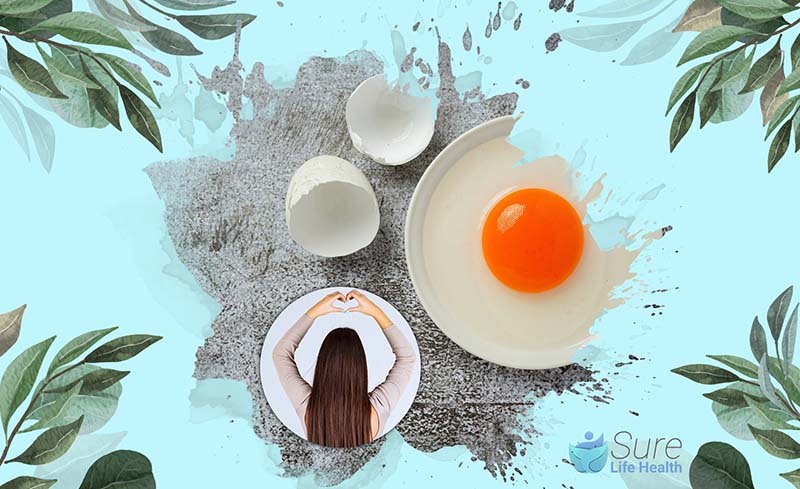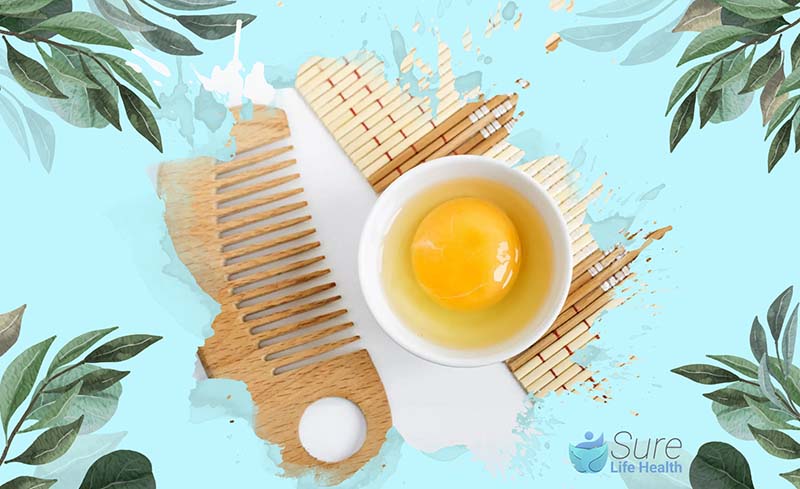Exploring the world of natural hair care solutions, “Is Egg Yolk Good for Your Hair?” highlights egg yolk as a remarkably effective ingredient. Rich in vital nutrients, egg yolk not only promotes hair health but also encourages robust growth.
This article explores the various benefits of egg yolk for your hair, outlines its application methods, and debates whether egg yolk or egg white is better suited for your hair care routine.
Is Egg Yolk Good for Your Hair?
Definitely! Egg yolk isn’t just good for your hair—it’s fantastic. The rich blend of proteins, vitamins, and minerals in egg yolks makes it an all-encompassing remedy for various hair issues.
If you’re battling dull hair, breakage, or sluggish growth, introducing egg yolk into your hair care practices can bring about significant improvements.

What Benefits Do Egg Yolks Offer For Hair?
To fully appreciate the benefits of egg yolk for hair, it’s essential to understand the root causes of common hair problems. Factors such as poor nutrition, harsh chemical treatments, environmental oxidative stress, and frequent heat styling can deplete your hair’s natural proteins.
Egg Yolk Enhances Damage Resistance: Egg yolk is enriched with vitamins that help fortify hair against damage. It’s particularly beneficial for moisturizing dry hair, restoring luster and elasticity.
Nutritional Powerhouse for Hair Health: Egg yolk acts as a superfood for your hair, packed with a unique combination of vitamins that promote hair health. Vitamins A and E, biotin, and folate are among the key nutrients identified by researchers as crucial for hair growth and maintaining healthy hair.
Iron for Hair Regeneration: Iron deficiency is one of the most prevalent nutritional shortages globally. Iron plays a critical role in the production of new cells, including those of hair follicles. Each egg yolk provides a small but impactful dose of iron.
Promotes Faster Hair Growth: Topical application of egg yolk on the scalp can enrich hair roots with vital nutrients, ensuring that newly grown hair is stronger and less susceptible to breakage and shedding. This can lead to fuller-looking hair and may even accelerate perceived growth rates.
Why Choose Eggs for Healthier Hair?
Eggs are a veritable superfood for hair health, loaded with essential nutrients that fortify and enhance hair quality. Vitamins A and E, biotin, and folate in eggs contribute to maintaining thick, healthy hair. The yolk, rich in healthy fats, replenishes moisture and imparts a sleek, shiny appearance to hair strands. Since hair comprises about 80% protein, applying protein-rich eggs helps restore the protein lost through styling, thus strengthening hair and enhancing its heat resilience.
Beyond benefiting the hair shaft alone, eggs also significantly impact scalp health. Applying eggs directly to the roots delivers crucial vitamins and minerals to the hair follicles, nurturing the scalp and promoting the growth of stronger, more resilient hair. This nourishment reduces the likelihood of breakage and shedding, resulting in hair that not only feels healthier but also looks thicker and more voluminous.
Can Egg Whites Benefit Hair?
While the benefits of egg yolks for hair moisture and softness are well-documented, egg whites also hold potential advantages for hair care.
Egg whites, the clear liquid separate from the yolk, are packed with proteins and vitamins such as niacin and riboflavin. These nutrients are essential for hair growth and the regeneration of healthy hair.
Although there is limited research on the cosmetic benefits of egg whites, they are commonly used as a clarifying treatment. The enzymes in egg whites are believed to help eliminate excess buildup, leaving hair clean and refreshed.
Egg whites are particularly recommended for those with oily hair due to their ability to strip away excess oils. Here’s a simple method to use egg whites for hair treatment:
- Take half a cup of egg whites and apply them to clean, damp hair.
- Leave the treatment on for 20 minutes.
- Rinse with cool water to remove the mixture thoroughly.
- Follow with your usual shampoo routine.
For a comprehensive treatment that balances moisture and oil control, using the whole egg is effective. This approach combines the hydrating effects of the yolk with the cleansing properties of the white, catering to various hair needs in one go.

How to Use Egg Yolks for Hair Care
Hair Mask: Egg yolk is a powerhouse for hair treatment, especially when used in a hair mask. Combine egg yolk with olive oil for a nourishing hair mask that leverages the full benefits of egg yolk. Alternatively, you can use a whole raw egg for a deep moisturizing treatment. To apply, mix the egg or egg-oil combination thoroughly. With gloves, use your fingers to spread the mask evenly through your hair, ensuring to cover the scalp and the ends. Allow the treatment to sit for about an hour before rinsing it out with cold water to prevent the egg from cooking in your hair.
Dietary: Beyond topical applications, incorporating eggs into your diet can enhance hair health. Eggs are rich in protein, B vitamins, and folate, essential for overall nutrition which reflects in the health of your hair. Regular consumption of eggs can contribute to stronger, healthier hair.
Supplements: For those looking to avoid dietary cholesterol or messiness of masks, supplements containing egg yolk proteins are available. These offer a concentrated form of the nutrients found in egg yolks. However, it’s important to note that evidence supporting the effectiveness of these supplements for hair improvement is largely anecdotal. Additionally, as the U.S. Food and Drug Administration does not regulate supplements for purity or quality, consulting with a healthcare provider before starting any new supplement regimen is advisable.
Risks and Side Effects of Using Eggs on Hair
Using egg yolk for hair care is generally safe with minimal risk. However, there are some potential side effects to be aware of. If you have an egg allergy, avoid using egg yolk as a topical treatment, as it could trigger an allergic reaction.
When it comes to dietary consumption, be mindful of the cholesterol content in egg yolks. While consuming one egg per day is typically safe for most people, eating large quantities can be problematic for those at high risk of heart disease, or who already have heart disease or diabetes.
Note: Always perform a patch test before applying egg yolk treatments to your scalp and hair to ensure you do not have an adverse reaction.
Conclusion
Implementing egg yolk treatments in your hair care regimen may take several weeks of consistent use before noticeable results appear. While “Is Egg Yolk Good for Your Hair?” treatments might not be effective for everyone, they offer a low-cost, straightforward method to potentially enhance the health and appearance of your hair.
Given its natural properties and the minimal risks associated with its use, trying out egg yolk for hair care is certainly worth considering if you’re exploring natural treatment options.
Be sure to explore more insightful blogs from Sure Life Health, where we continue to shed light on the latest trends and breakthroughs in health and wellness.
Professor Gaye Cunnane, PhD, MB, FRCPI
As the Director of Health and Wellbeing at RCPI, Professor Gaye Cunnane is at the helm of initiatives aimed at enhancing the health and well-being of RCPI Trainers and Trainees. Her role extends beyond administration; she is also a respected clinical professor of rheumatology and a consultant rheumatologist at Trinity College Dublin (TCD) and St James’s Hospital. Prof. Cunnane’s medical journey began at TCD, where she graduated from medical school, and her path has been marked by both clinical and academic excellence.
After completing her basic clinical training in medicine, she embarked on PhD studies at University College Dublin and St Vincent’s University Hospital. Her research during this period was focused on prognostic markers in early inflammatory arthritis, a project that saw her collaborating with esteemed universities across Europe, including in Switzerland, The Netherlands, the UK, and Sweden.
Prof. Cunnane’s career took her to the University of California, San Francisco, where she spent three years delving into research on new treatments for lupus. Her academic prowess led her to the University of Leeds in 2001 as a senior lecturer, before returning to Ireland in 2003 to assume her current roles. She has also served as the National Specialty Director for Rheumatology training in Ireland, Programme Director for Basic Specialist Training with RCPI, and as a past President of the Irish Society for Rheumatology.
PUBLISHED ARTICLES
“Rheumatic disease differentiation using immunoglobulin G sugar printing by high-density electrophoresis”: Published in The Journal of Rheumatology, this study reflects her in-depth investigation into rheumatic diseases.
“Benefits of exercise in patients with rheumatoid arthritis: a randomized controlled trial”: This research work, highlighting the positive impact of exercise on rheumatoid arthritis, underscores Prof. Cunnane’s dedication to practical, patient-centered research.
Additionally, Prof. Cunnane has made notable contributions to the Annals of the Rheumatic Diseases, discussing early referral, diagnosis, and treatment of rheumatoid arthritis. She has also been involved in a study on the NCBI platform investigating exercise benefits in rheumatoid arthritis patients.
Professor Gaye Cunnane’s career is a testament to her commitment to improving patient outcomes in rheumatology through rigorous research, clinical excellence, and dedicated teaching. Her work continues to influence the field of rheumatology, both in Ireland and internationally.

